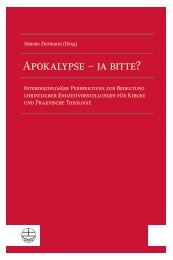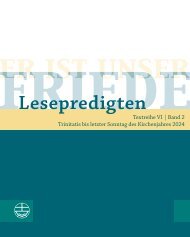Phillip A. Davis, Jr. | Daniel Lanzinger | Matthew Ryan Robinson (Eds.): What Does Theology Do, Actually? (Leseprobe)
You also want an ePaper? Increase the reach of your titles
YUMPU automatically turns print PDFs into web optimized ePapers that Google loves.
Bible and Method 73<br />
Biblical studies’ heavy, ongoing investment in critical methodologies, its<br />
methodolomania, 6<br />
has attracted scrutiny for different reasons, but can also be<br />
challenged in particular for the accompanying unacknowledged interests and<br />
their inevitable, overt or subtle, promotion of such interests. Method is not merely<br />
the guide showing the academic way, but conjures up scenarios within which<br />
scholarly engagement can or cannot take place, creating structures that both<br />
enable engagement and disable or disallow scenarios considered inapt. 7<br />
Amid<br />
issues pertaining to power in and of interpretation, unacknowledged interests<br />
together with an insistence on objective, neutral interpretation amount to an<br />
‘‘innocence syndrome’’ and has compellingly been exposed time and again as<br />
feigned and dangerous: feigned, given interpreters’ situatedness that provides<br />
the context from where and through which human existence for the individual<br />
and / or groups involved, are filtered and thus defined; and dangerous, because<br />
‘‘the myth of innocence is in itself a highly political agenda’’, 8 with the peril intensified<br />
by attempts to disguise and sublimate it. 9<br />
Putting innocence aside allows that the grounding of biblical interpretation<br />
and decisions about method can be accounted for in chronological and socially<br />
determined moments; 10<br />
after all, both interpretive results and processes and<br />
mechanisms of interpretation are contextual. Growing acknowledgement of the<br />
socio-political situatedness of methodologies implies accounting for the effect of<br />
methodologies in biblical studies by taking scholars’ (and scholarship’s) social<br />
locations into account. Biblical scholarship that takes its social embeddedness<br />
serious as point of departure and frame of understanding does not discount<br />
proper and adequate historical consciousness in a zero-sum game. Bridging the<br />
6<br />
À la Sandmel, who coined the term parallelomania for the relentless search (claims!) for<br />
parallels and analogies often without historical or literary basis, in biblical and related<br />
studies; cf. Samuel Sandmel, ‘‘Parallelomania,’’ Journal of Biblical Literature 81 (1962): 2---<br />
13. With methodolomania is meant the enchantment with methodologies for their own<br />
sake, to the extent of replacing interest in the texts they are applied to, often with little<br />
theoretical concern regarding the methodologies and their use, and apparently oblivious<br />
to interpretive contexts or settings.<br />
7<br />
In a similar way that map is not territory (cf. Jonathan Z. Smith, Map Is Not Territory:<br />
Studies in the History of Religions [Chicago and London: The University of Chicago Press,<br />
1978]), method is not procedure; at least, method is not simply procedures and techniques<br />
to be followed.<br />
8<br />
Fernando F. Segovia, Decolonizing Biblical Studies: A View from the Margins (Maryknoll:<br />
Orbis, 2000), 173.<br />
9<br />
The post-Enlightenment historical and literary critical reader assumes a disinterested,<br />
objective, and also apolitical stance, all of which are a myth; cf. Kevin J. Vanhoozer, ‘‘The<br />
Reader in New Testament Interpretation,’’ in Hearing the New Testament: Strategies for<br />
Interpretation, ed. Joel B. Green (Grand Rapids, Carlisle: Eerdmans, Paternoster, 1995),<br />
312.<br />
10<br />
Cf. Joel B. Green, ed., Hearing the New Testament. Strategies for Interpretation (Grand<br />
Rapids, Carlisle: Eerdmans, Paternoster, 1995), 6.
















